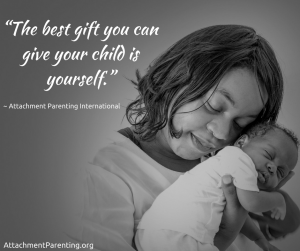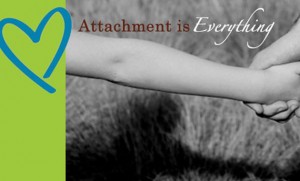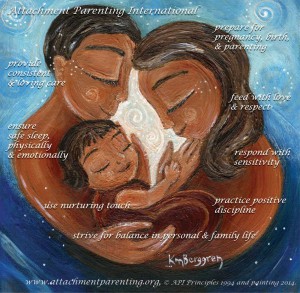“There is a sensible way of treating children. … Never hug and kiss them, never let them sit in your lap. If you must, kiss them once on the forehead when they say good night. Shake hands with them in the morning. Give them a pat on the head if they have made an extraordinarily good job of a difficult task. Try it out. … You will be utterly ashamed of the mawkish, sentimental way you have been handling it. … When I hear a mother say ‘Bless its little heart’ when it falls down, or stubs its toe, or suffers some other ill, I usually have to walk a block or two to let off steam. Can’t the mother train herself when something happens to the child to look at its hurt without saying anything…?” ~ Psychological Care of Infant & Child by James B. Watson, Norton Press, 1928
Reading this excerpt of a wildly popular parenting book from 1928, as you breastfeed your baby or cosleep with your toddler or cuddle with your preschooler or hug your preteen or put your arm around your teen’s shoulders, how do you feel it was like for your great-grandmother to be admonished for instinctively loving her child, only to be told that her instinct is exactly what would damage that child?
Parenting has come along way since 1928.  By the time our grandparents were caring for their babies in the 1950s, psychoanalyst John Bowlby was making great strides in scientific circles with research demonstrating the enormous impact that nurturing — and lack of nurturing — had on child development. This important body of research has since greatly influenced parenting advice.
By the time our grandparents were caring for their babies in the 1950s, psychoanalyst John Bowlby was making great strides in scientific circles with research demonstrating the enormous impact that nurturing — and lack of nurturing — had on child development. This important body of research has since greatly influenced parenting advice.
Eventually Bowlby’s work would be integrated into the ever-expanding domains of research, including breastfeeding science, that has sent a shock wave of nurturing-oriented parenting around the world.
In 1994, as our parents were caring for us at home, La Leche League Leaders and schoolteachers Lysa Parker and Barbara Nicholson cofounded Attachment Parenting International as a way to educate and support parents in raising children with abundant warmth and nurturing. The tide was still changing then, but today, we are free to nurture our children without a feeling of shame. We can kiss and hug them. We can let them sit on our laps.
 The child-rearing “experts” just a few generations ago would be appalled at how today’s parent educators encourage affection, nurturing touch, and comforting of our children. Research has since established how incredibly beneficial — in fact, absolutely critical — to child development that we are nurturing toward our babies and children.
The child-rearing “experts” just a few generations ago would be appalled at how today’s parent educators encourage affection, nurturing touch, and comforting of our children. Research has since established how incredibly beneficial — in fact, absolutely critical — to child development that we are nurturing toward our babies and children.
But the impacts of the hands-off approach to parenting that our great-grandmothers experienced has had far-reaching effects. Remnants survive still today. They’re there whenever someone asks us if our baby is sleeping through the night yet, or suggests we try “cry it out” to teach our baby to self-soothe, or warns us that holding our baby too much will spoil her, or insists that babies be weaned by their first birthday, or maintains that children be spanked, or advises any parenting approach that promotes so-called early independence and obedience over normal, healthy child development and sensitively met needs.
We hear it from our family members, our schools, our pediatricians, our politicians, parenting books that continue to be published influenced by this old-fashioned thinking despite the mountains of research to the contrary — ideas of how children should be raised, based on personal opinion rather than research-backed fact, subtle revelation of how our society is still scared of giving “too much” nurturing to our children. It’s a pervasive situation that still needs to be addressed.
 The fact is, nurturing isn’t damaging. Babies and children need nurturing like they need food or shelter — nurturing is an essential basic need — and they are biologically designed to expect and receive nurturing.
The fact is, nurturing isn’t damaging. Babies and children need nurturing like they need food or shelter — nurturing is an essential basic need — and they are biologically designed to expect and receive nurturing.
Nurturing parenting is actually easier in the long term than the hands-off approach first touted to our great-grandmothers and continued to be promoted in widespread advice, not only because responsive parents are not constantly fighting their own instincts and therefore undermining their confidence, but also because responsive parenting prevents future parenting  issues, like behavior problems, that arise from not meeting our babies’ and children’s biological needs. A child who grows up learning that his biological needs for nurturing will go unmet or be misunderstood is a child who will increasingly develop ways of communication and interaction that are less healthy in future relationships.
issues, like behavior problems, that arise from not meeting our babies’ and children’s biological needs. A child who grows up learning that his biological needs for nurturing will go unmet or be misunderstood is a child who will increasingly develop ways of communication and interaction that are less healthy in future relationships.
Nurturing parenting is an early investment whose payoff continues well beyond the short term. When a child’s biological need for nurturing is consistently met, positive discipline naturally emerges. The trust that children develop  as a result of having their emotional needs met sets a foundation of parent-child interaction that doesn’t have to rely on threats, shame, punishment, rewards, or other forms of coercion for behavior control.
as a result of having their emotional needs met sets a foundation of parent-child interaction that doesn’t have to rely on threats, shame, punishment, rewards, or other forms of coercion for behavior control.
Research and children unanimously agree that warm and nurturing parenting is not only optimal, but required for healthy development. The child’s brain develops in response to the care received, so children with less optimal caregiving are more likely to experience challenges not only in their childhoods but across their lifetimes.
Reams of research tell us the obvious: that high levels of family stress can contribute to profound effects on a child’s ability to learn, remember, emotionally self-regulate, and succeed in adulthood.
Many parents carry with them the unaddressed traumas of childhood with limited nurturing or harshness, passed down through the generations since their great-grandparents’ time. This trauma legacy may show up in subtle, or obvious, over-reactions or under-reactions to normal, healthy child behaviors. We silently pass the legacy to our children and their children when we fail to observe the effect on our families and instead find confirmation and justification in the surviving remnants of 1928 child-rearing advice still popular today.
Research is continually finding new ways to illustrate the impact of abundant nurturing on our children. Brain scans show physical differences between the shape and connectivity of different areas of the brain involved in socio-emotional and cognitive functioning. Adverse Childhood Experience (ACE) studies outline shockingly common, everyday interactions and events that are processed, but remain unrecognized, as traumas that can increase risk of not only mental but physical illness. Tests on heart function and hormone levels reflect how the body reacts to emotionally stressful events that were previously assumed limited to our thoughts.
Increasingly, we are learning that our emotional psychology has as physical roots as our bodily health — and how much our experiences as babies and young children, especially, form a foundation that can either be stable and secure, or predispose us to a susceptibility of lifelong difficulties.
Attachment Parenting International works to bring a wide body of authoritative, decades-worth of scientific evidence, as well as emerging research, to support parents and influence professionals and society. The common theme of this research clearly points to the critical importance of nurturing our children and describes behaviors that can provide this type of caregiving.
The research calls for parents to examine their assumptions, expectations, and thoughts regarding child-rearing and to then make changes to how they view themselves, children, and parenting to better reflect their goals, values, and healing. Many parents choose not to do this — to instead parent on autopilot, which is easier than parenting with intention — but our unexamined, default modes of parenting are how family legacies of pain pass silently from one generation to the next.
 Our children are worth the effort to do the best we can. They’re our future, and we want them to be ready and excited for that future, free of emotional traumas borne of parenting ideas of nearly a century ago. Your donation helps Attachment Parenting International support parents. Every dollar counts.
Our children are worth the effort to do the best we can. They’re our future, and we want them to be ready and excited for that future, free of emotional traumas borne of parenting ideas of nearly a century ago. Your donation helps Attachment Parenting International support parents. Every dollar counts.








